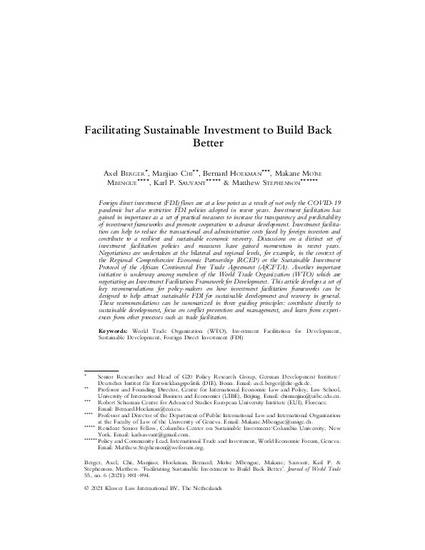
Article
Facilitating sustainable investment to build back better
Journal of World Trade
(2021)
Abstract
Foreign direct investment (FDI) flows are at a low point as a result of not only the COVID-19 pandemic but also restrictive FDI policies adopted in recent years. Investment facilitation has gained in importance as a set of practical measures to increase the transparency and predictability of investment frameworks and promote cooperation to advance development. Investment facilitation can help to reduce the transactional and administrative costs faced by foreign investors. Discussions on a distinct set of investment facilitation policies and measures have gained momentum in recent years. Negotiations are undertaken at the bilateral and regional levels, for example, in the context of the Regional Comprehensive Economic Partnership (RCEP) or the Sustainable Investment Protocol of the African Continental Free Trade Agreement (AfCFTA). Another important initiative is underway among members of the World Trade Organization (WTO) which are negotiating an Investment Facilitation Framework for Development. This policy brief develops a set of key recommendations for G20 policy-makers on how investment facilitation frameworks can be designed to help attract sustainable FDI for sustainable development and recovery in general. These recommendations can be summarized in three guiding principles that should be promoted by the G20: contribute directly to sustainable development, focus on conflict prevention and management, and learn from experiences from other processes such as trade facilitation.
Disciplines
Publication Date
November, 2021
Citation Information
Axel Berger, Manjiao Chi, Bernard Hoekman, Makane Moïse Mbengue, Karl P. Sauvant, and Matthew Stephenson, "Facilitating sustainable investment to build back better", Journal of World Trade, vol. 55 (Nov. 2021), pp. 881-894.
